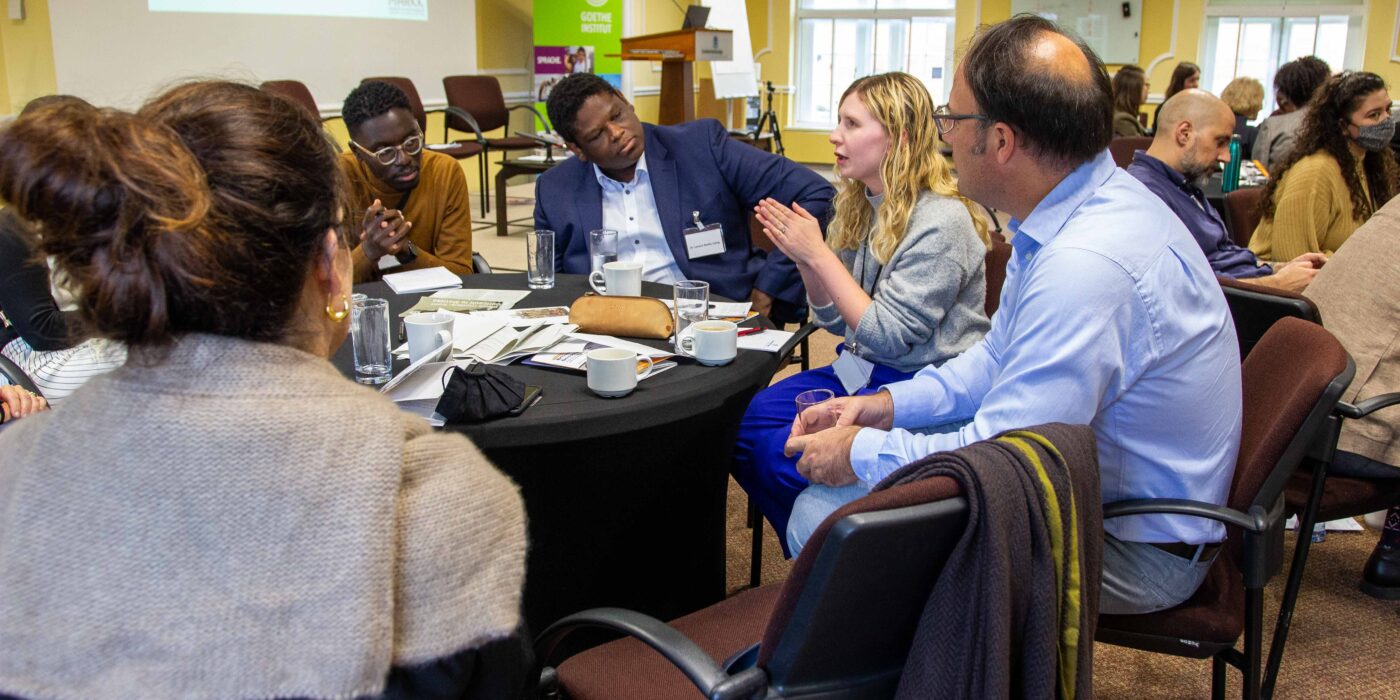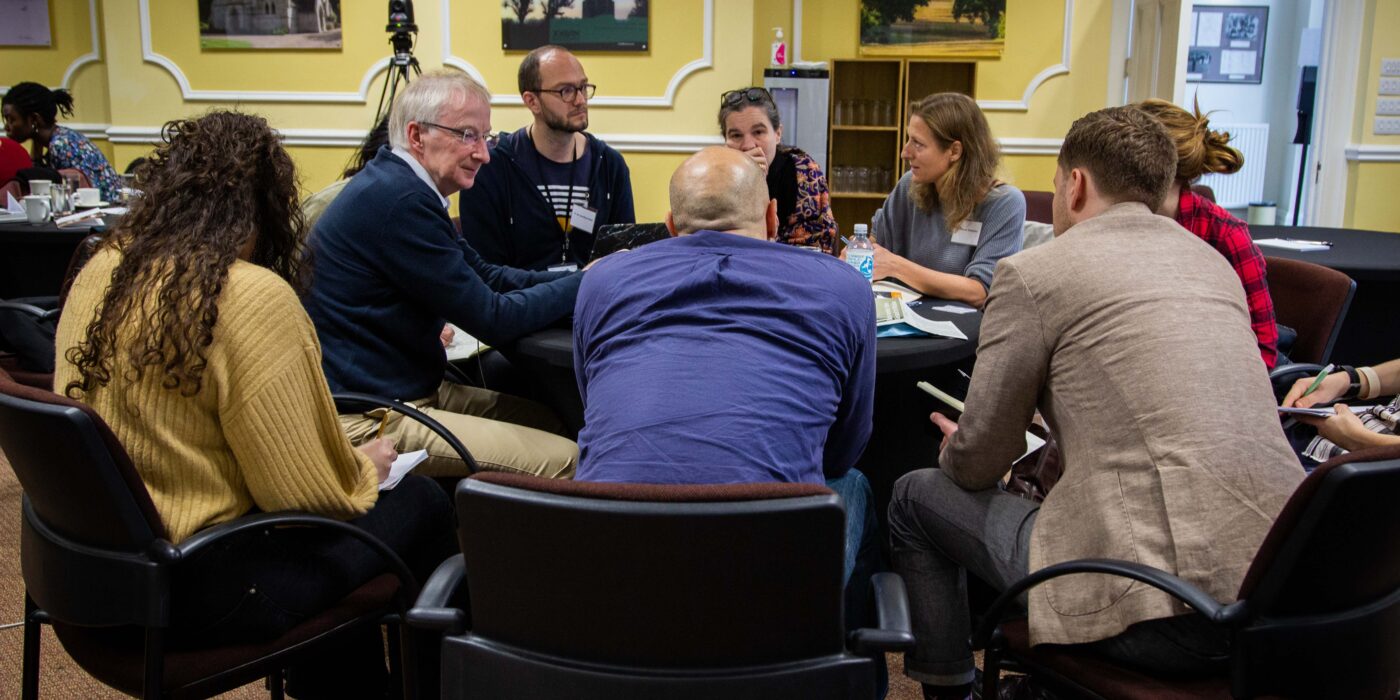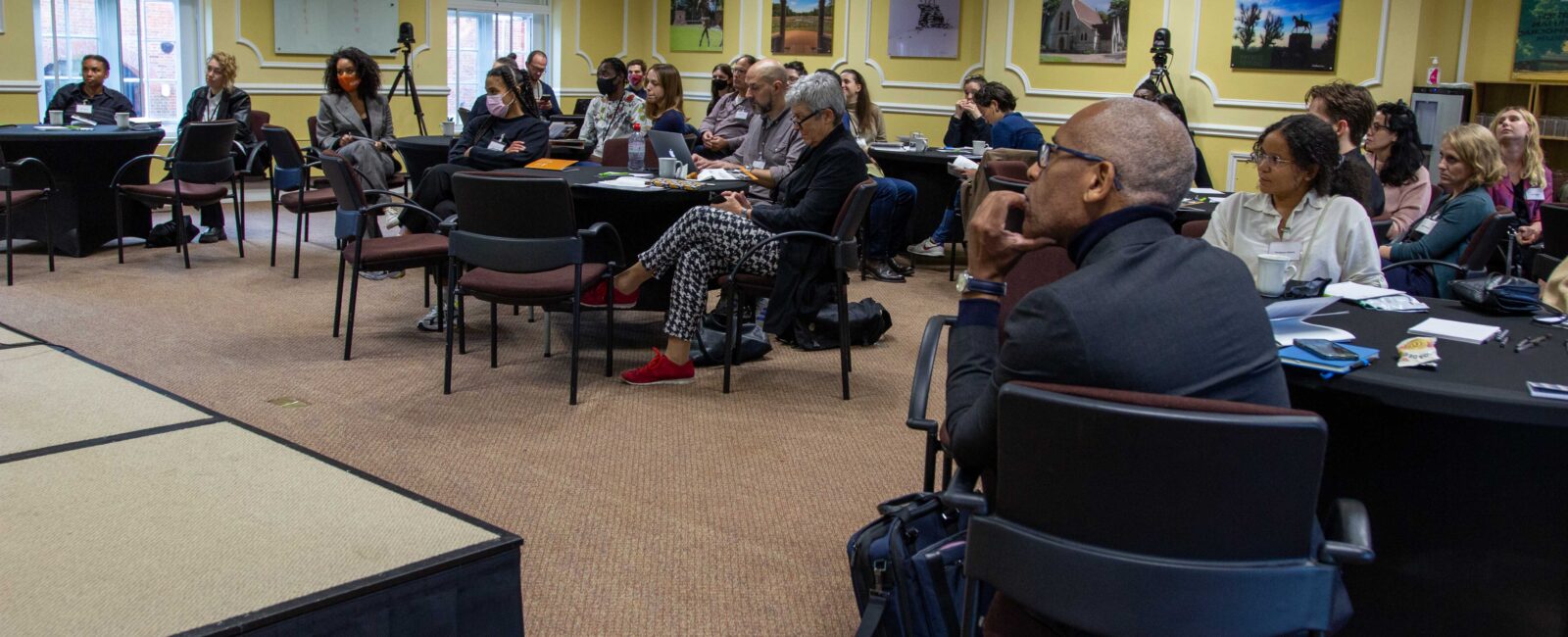The inaugural British-German Democracy Forum, hosted in partnership with the Goethe-Institut, took place at Cumberland Lodge on 25-27 October 2021. Curators Eric Otieno and Lord Simon Woolley CBE worked alongside the Lodge to bring together an array of people, with diverse heritages, worldviews and experiences, to discuss the difficult histories shared by British and German democracies.
The Forum generated discussion on how current society can be mindful of past transgressions, such as colonialism and slavery, to make progress towards a more equitable and fairer world for future generations.
What is in a name?
What does your name tell us about you and your history? All attendees answered this question to develop an understanding of self. It is a task that resonated with delegates, as we realised that so much history is packed into a few short words.
A writer and filmmaker whose work focuses on decolonial approaches to history and the present day, led this interactive task which encouraged attendees to engage in debate and discussion. The session focused on the idea of personal agency and how this can be used to achieve certain goals within our democracies to foster belonging and remove iniquities.
In addition, the facilitator ran exercises that stimulated attendees to consider the motives, functions, and strategies behind past socio-political activities of British and German empires such as colonialism. The goal was for everyone to consider where their sphere of power lies and how we can all implement strategies to achieve democratic goals in our own spheres.
Understanding colonialism
It is likely that those who are not involved directly with this field of work, like me, gravitate towards institutions such as museums and galleries to inform us of past histories and the stories of the artefacts they possess. However, we must also be mindful of how they impact the retrospective view of colonialism.
There are different modalities in which histories can be recorded and passed through generations, including orally, by inheriting a title or position, or through simple everyday items that feature within that culture such as native garments and household tools. This raises the question: do museums and galleries provide a true representation of material culture?
One contributor to the conference stressed how traditional methods used by institutions provide one-sided stories, solely from the perspective of colonial powers like Germany and the UK. As a result, the true sentiments and emotions behind the items are eradicated, and thus, their true story fades with them.
Curators and projects such as Dekolonise Hamburg have shown how institutions can approach this issue differently and provide native people with a medium to demonstrate their stories and histories, through their work regarding Cameroonian leader Duala Manga Bell.
What are post-hoc views of colonialism?
To consider how colonial operations by the UK and Germany are viewed now, one guest speaker stimulated a tense and provoking conversation relating to their research biographies. After conducting extensive work within former German colonies, they found the experiences of colonialism are highly nuanced and may differ, meaning although many natives tend to have negative views of being colonised, others may have more positive views.
Another speaker provided an alternate view through their conceptualisation of how imperial powers influenced – and continue to influence – the colonised, such as committing atrocities by executing rebellious factions to the imperial power (genocide), destroying the land (ecocide) and altering the realities of native people (epistemicide).
These talks generated a hot debate amongst participants as to the implications of each speaker’s research and findings. This extended to forming ideas encompassing how democratic societies can become more inclusive and open to avoid relapsing into patterns of past social and political behaviour.

Are we still experiencing democrises like that of colonial times?
An interesting blend of presentations opened the second day of the programme, addressing the potential ‘democrises’ that have existed within British and German society over the past few centuries. One speaker depicted the tactics colonial powers used to generate a sense of universalism in past centuries, identifying that this was mainly achieved by distributing propaganda that portrayed imperium as right, virtuous, and therefore justified, whilst barbarism was depicted as inhumane and wrong.
Another speaker then demonstrated how parallels with this type of tactics still exist within modern society, using the example of how the UK used life models of First World War soldiers to instil a sense of patriotism and national identity as the centenary of the conflict approached.
Brand New Bundestag
The schedule included smaller breakout sessions to delve into personal debate around democratic initiatives at play with the UK and Germany. One session, facilitated by a core team member at Brand New Bundestag (BNB, the German government), discussed how academia and activism can influence policy and government in real-world settings. This is embodied in BNB, which takes individuals from underrepresented backgrounds to provide them with resources and support to run for office.
Particularly, BNB recognises those who have not considered running for office before to assist them in projecting progressive views and agendas onto the German political landscape. We learned of the approach that candidates take in their preparation towards the German political ladder. We then discussed how BNB provides a supportive framework via regular interactions to consider the process of effecting change within German democracy through progressive action.

Multidirectional memory
Unfortunately, most of the infrastructure and establishments that are foundational to our modern societies are predicated on the violent history of colonialism and other political regimes such as Nazism and Imperialism. One speaker explored how modern western societies have used the concept of time, firstly, to orientate reality around themselves, and secondly, to shy away from taking accountability for past crimes.
The speaker began by questioning who is truly in the present? They used the example of how time (e.g., time zones like the Greenwich Meridian Time) is centred around the UK. Therefore, societies that are located further outside of this central reference point in time can perceive that their relation to the present is vastly different to those within western societies.
Next, the speaker addressed how past colonial powers have used time to argue that some histories and past behaviours are far removed, even though their effects can still be seen and experienced today. Demonstrating how time can be manipulated to remove accountability from past crimes.
Several theories and concepts justified these observations, yet questions by attendees pondered ways that divides can be bridged in the present and future. Some consider that common ground must be found between members of a society, however, others argued this is never truly attainable due to the diversity in people that make up our modern societies. Therefore, shaping societal behaviours through education may be the more favoured approach to bridge divides that remain in British and German society.
A scientific basis for power and social change
Power permeates every human relationship and interaction. Therefore, how we process and perceive power is crucial to the relationships we maintain. One speaker shared how expertise from neurologists can help us understand the basic functions of the brain and its foundation behind concepts of power.
To illustrate this, the speaker demonstrated that the two central functions of the brain are preservation and anticipation. This is achieved through a complex budgeting and distribution of bodily resources. Therefore, there is a clear biological basis for the representations of self that we develop. The crux of the talk gravitated towards conversations that helped attendees further identify where their power to affect change lies, and how this power can mediate social change in our modern democracies.
Concluding remarks
The inaugural British-German Democracy Forum was an eye-opener. Throughout the Forum it became evident that past behaviours of British and German societies involved oppression and prejudice, which is encapsulated in the colonising actions both of our societies exercised.
On reflection, some differences in opinion remain as to how democracies can challenge the enduring issues of prejudice and its many forms that persist within modern British and German societies. However, there was a consensus that although some truths are uncomfortable, they are still truths. Therefore, we must remember that each of us in our own sphere of power, has the potential to enact change to ensure that our modern democracies are fairer, more equitable, and inclusive.


